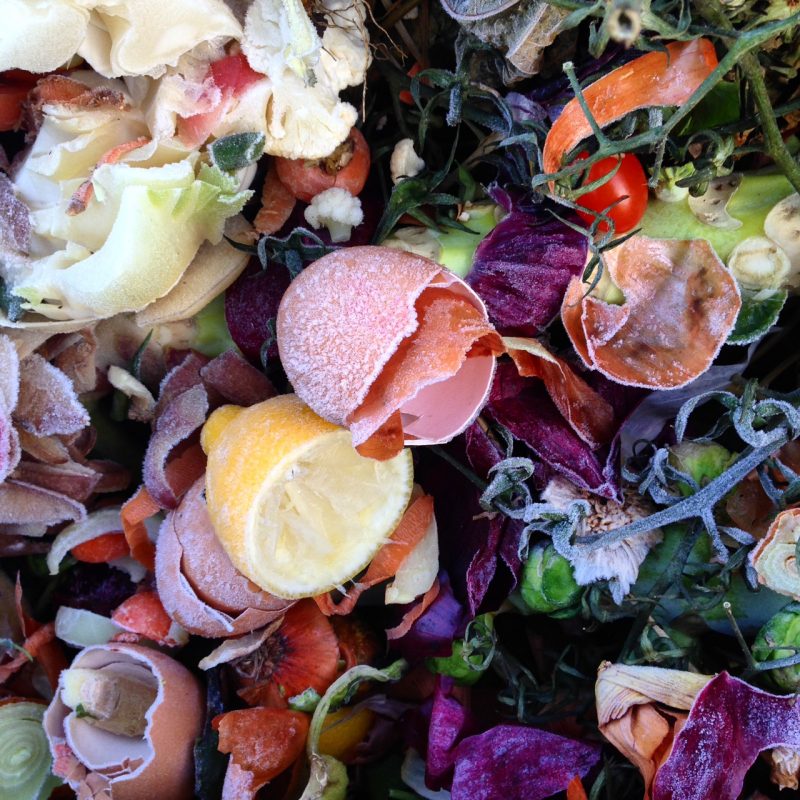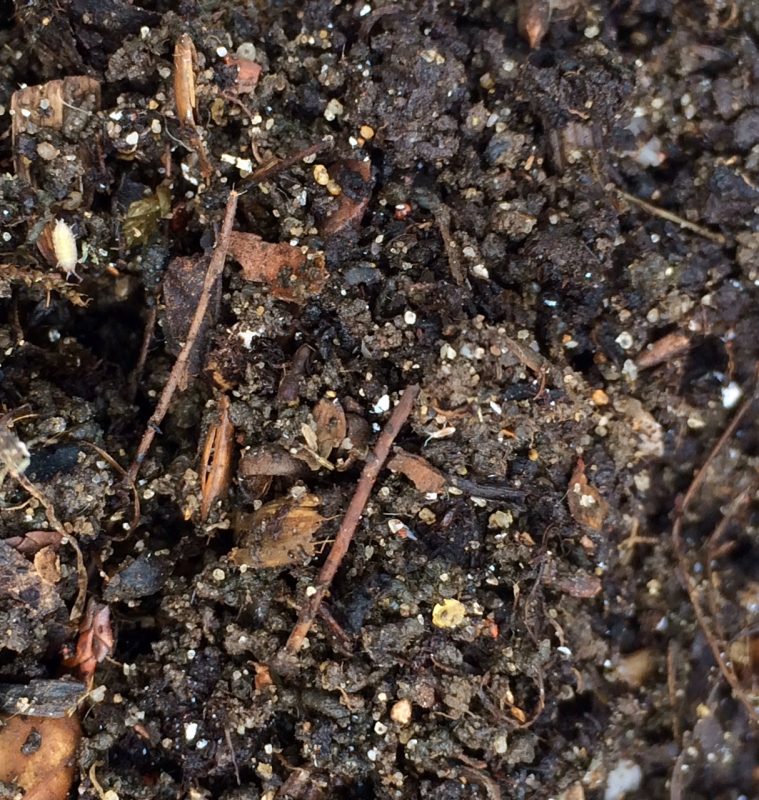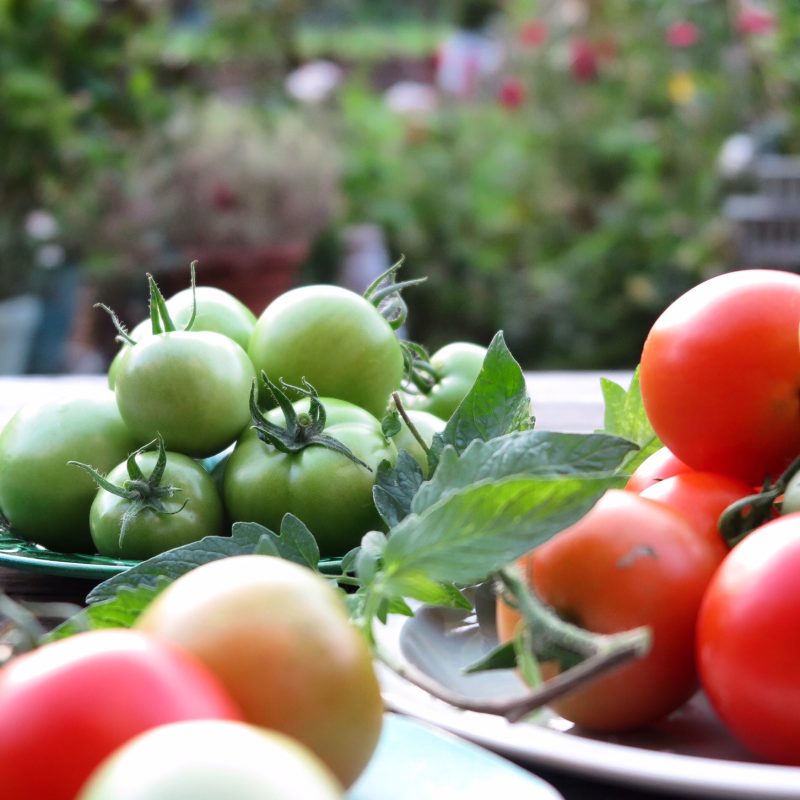Is there really such a thing as easy home-made compost?
Don’t you have to get the proportions right? And what about the long and complicated list of things you can and cannot put on the compost heap?
Lawn clippings, potato peelings and weeds are all the subject of compost arguments.

All garden clippings, uncooked fruit and veg, plus eggshells and coffee grounds can go on the compost.
A friend of mine accused her mother of caring more about her compost than she did about her grand-children. Her mother conceded that she was probably right.
The no-fuss approach to easy home-made compost
Simply treat your compost as a green dustbin. Put in all garden clippings and uncooked fruit and veg. Tea bags, coffee grounds and eggshells are fine, too. Garden expert and florist Charlotte Molesworth puts ‘everything’ into the compost, including old clothes. She doesn’t worry about proportions of green to woody material, and nor do I.
Don’t worry about potato peelings or woody material. If a potato does sprout, you can rip it out. Woody material will take longer to rot down, but it will get there. We do save proper branches for the fire.

An attractive ‘bee-hive’ compost bin at the Abbey Physic Garden in Faversham.
If you can clearly see that lawn clippings are taking over, you can tear up newspaper and add it. I get shredded documents from the accountancy firm next door. Reading occasional half-words is fascinating – I read the word ‘vice’ once, which was very exciting.

There may be something wrong with your life if you find yourself reading your compost…could that be ‘naked funds’?
The only no-nos
Don’t put cooked food, meat, fish or dairy into your compost bin unless it’s sealed (like a Hotbin).
And there is a chance that weeds may grow again if you compost them when they’re still alive. Let them die before composting them, or send them to the public tip to be on the safe side.
Only put wood ash on the compost if you know there is no coal in it. Coal has dodgy chemicals.
Other things you don’t need to worry about
I worried about covering my compost bins, but if I do, the dog can use them as a springboard to get over the wall. There is a 20ft drop on the other side. So I don’t cover my compost. It doesn’t seem to have done it any harm.
I don’t think Charlotte Molesworth’s compost pile was covered when I saw it. And when I go garden visiting, I’ve noticed that there are big piles of uncovered compost in the corners of grand gardens.

Charlotte Molesworth has created one of the loveliest gardens in Kent. She throws ‘everything’ onto the compost pile.
This may be about how fast it takes compost to rot down, but the Really Lazy Composter won’t care how long the compost takes.
I don’t think leaving it uncovered has made it smell, either. Nor has it gone slimy.
I have also stopped worrying about the principle of having three bins. The idea is that you have one bin to fill with garden clippings, one that is maturing and one with usable compost. You rotate the bins.
We do have three bins, but I fill them with whatever I can cram in. They each have a flap at the bottom, so I can get the actual compost out of the bottom when it’s ready.
The easiest way to turn compost
A friend showed me how to turn compost with minimum effort. A few years later, I told him how useful his tip had been. He replied that he should probably have devoted more time to his marriage and less to compost. What is it with compost and gardeners?
The tip is to thrust your garden fork as deeply as possible into the compost pile. Move the handle around in ever-increasing circles. I lean all my weight against it to turn it, but there’s no pressure on my back.
Watch fascinated as the hole gets wider and the compost heap shrinks. Repeat in another part of the compost heap.
It would be good to do this weekly, but that is a counsel of perfection. This post is not about perfect compost. It’s about good enough compost.
And another good cheat
Compost accelerator really does accelerate compost. It’s not the sort of thing I would normally bother with, as the Really Lazy Composter rarely wants to fiddle with measuring things out into watering cans.
However, Bio8 sent me some Envii compost accelerator tablets to review. I trialled it, using Envii in one compost bin and no accelerator in the other.
The compost in the Envii bin broke down noticeably faster. Both bins were mainly lawn clippings and shredded paper. I used the third bin for everything else, as I thought it was important to compare like with like.

Compost made mainly of lawn clippings and paper, accelerated by Envii, after about four months.
It’s such a relief that the trial has now ended. I can go back to stuffing everything in anywhere. I will continue to use compost accelerator because it clearly makes the larger, woodier pieces rot down more quickly.

The compost not treated with Envii after four months. It was much less rotted.
So compost really does make life simpler
If you can detach yourself from all the worries around compost, it really does make your life easier.
You don’t have to go to the tip with garden clippings so often. And if you run out of commercial potting compost, you can usually dig some home-made stuff out of the bottom of the bin.
In theory, you should sieve it. But that is another counsel of perfection. I have managed to pot on plants using my own home-made compost. They seem to have grown perfectly well.
Once a year, we do try to clear all the un-rotted material off the top of the bins. We then spread the rotted home-made compost on the vegetable beds.
That is quite a job. But it is only once a year.
Home-made compost saves you money
Larger gardens which have lots of clippings make lots of compost. Smaller gardens make much less compost and have to buy it in.
Even if you compost everything you possibly can, I think it’s unlikely that you can make enough compost yourself to keep your soil happy.
So making your own compost doesn’t mean you won’t have to buy any. It does mean you will need to buy less. I’ve worked out that making our own compost saves us about £100 a year.
The Envii compost accelerator costs £9.95, which treated one large bin for the year, so if I treat three bins, that will reduce the savings to around £70 a year.
PS I was originally going to do a post about using green tomatoes. I looked up lots of recipes for Fried Green Tomatoes. They were delicious, although not particularly easy.

I spent all morning photographing green tomatoes. But they gave me terrible indigestion. I wanted to use at least one picture anyway. And please don’t mention Green Tomato Chutney anyone.
Green tomatoes are very highly acidic. I didn’t feel it would be right to encourage anyone else to try them although I know that in Birmingham, Alabama, there are cafes that cook 140lbs of green tomatoes a day.
The rest of my green tomatoes are going on the compost heap! At least I don’t feel I am wasting them. That’s another good thing about compost.
Do join us every Sunday morning. Just inscribe your email address into the box on the top right and we will pop into your inbox as dawn comes up. Thank you!
The post How to stop worrying and love your easy home-made compost appeared first on The Middle-Sized Garden.
from The Middle-Sized Garden http://www.themiddlesizedgarden.co.uk/how-to-stop-worrying-and-love-your-easy-home-made-compost/
No comments:
Post a Comment